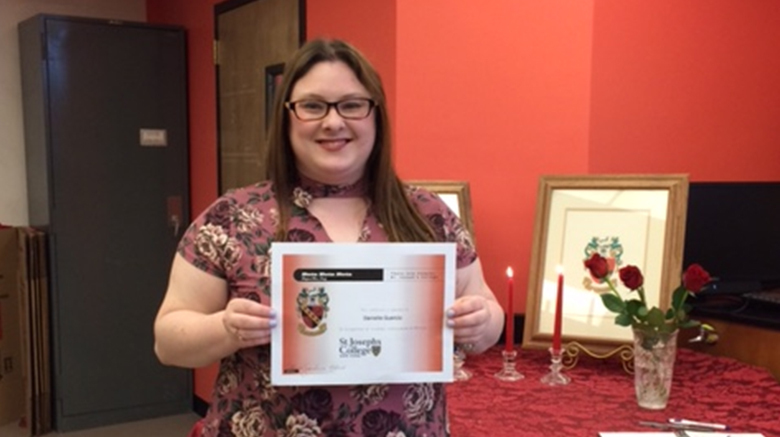After losing two family members to bladder cancer, Danielle Guercio knew exactly what she wanted to focus her research on on for her senior thesis — a treatment option for the deadly disease.
Guercio, a senior at SJC Long Island, worked closely with Valerie Giordano, Ph.D., associate professor of biology, in St. Joseph’s biology labs throughout the summer.
“My research was focused on working with bladder cancer cells in order to study a way to prevent cell growth,” said Guercio, a double major in biology and psychology who also minors in chemistry. “The chemical I used was called bufalin, which is a cardiotonic steroid, meaning it is a heart stimulant. It is isolated from the venom of Asiatic toads. This substance has been found to have adverse effects on cancer cells and no effect on cells of the same cell type. The purpose of my experiment was to further explore how this drug manipulates the cell cycle in the cancer cells.”
The Research Concluded…
Through her research, Guercio concluded that bufalin does in fact have adverse effects on cancer cells. The idea to work with bufalin, she said, came from Dr. Giordano.
“After conducting a dosage curve, based on my results, it was determined an optimal dose of the drug would be somewhere between 0.2 micromolar and 0.4 micromolar, which is promising because bufalin has been shown to have adverse effects on the heart at slightly higher dosages from previous studies conducted by other researchers,” Guercio, 21, said.
Unfortunately, the Holbrook resident experienced complications with her experiment and was unable to determine which protein concentrations were affected.
“I am interested in retesting this portion of my experiment in the future with either a different method or repetition of the old method, since the initial method is a very hard procedure to conduct,” she said.
What Guercio Gained from this Experience
“Although part of the experiment did not go as planned, I gained increased knowledge about the laboratory techniques needed to complete a research project, and it opened my eyes to the amount of time it takes to plan and conduct the experiment,” Guercio, a member of national biology honor society Tribeta, said. “It also showed me that this is the field I want to work in in the future.”
Guercio is currently filling out applications for doctoral programs in cell biology. She said she is thankful for Dr. Giordano’s help with her research.
“Dr. Giordano was a great thesis adviser,” Guercio said. “She made herself as available as much as possible, and she taught me how to do all of the laboratory techniques, ensuring I was doing all of them correctly. She also helped me with keeping up on schedule with the project and supported me any way she could.”
Guercio’s advice for other biology students who may be dreading their senior thesis? Don’t get upset if it doesn’t go the way you expect it to.
“The best advice I could give is to not get frustrated if the experiment does not work the first time; it is all part of the process,” she said. “No experiment is going to work perfectly, which gives opportunities for additional research in the field. Also, time management is key when it comes to both the experiment and the written portion of the project.”
Guercio is considering presenting her research at St. Joseph’s Research Symposium next May.
“This kind of research is important because cell biology is a complex field,” she said. “There are hundreds of interconnected cascades that all have different relationships. An experiment testing for one of these proteins can help the researcher understand a drug’s effect on another. Bufalin has been used as a treatment in cancer cells in vitro in previous studies, and different protein concentrations were evaluated. However, it is important to make sure experiments are repeated to ensure the data is reliable.”

